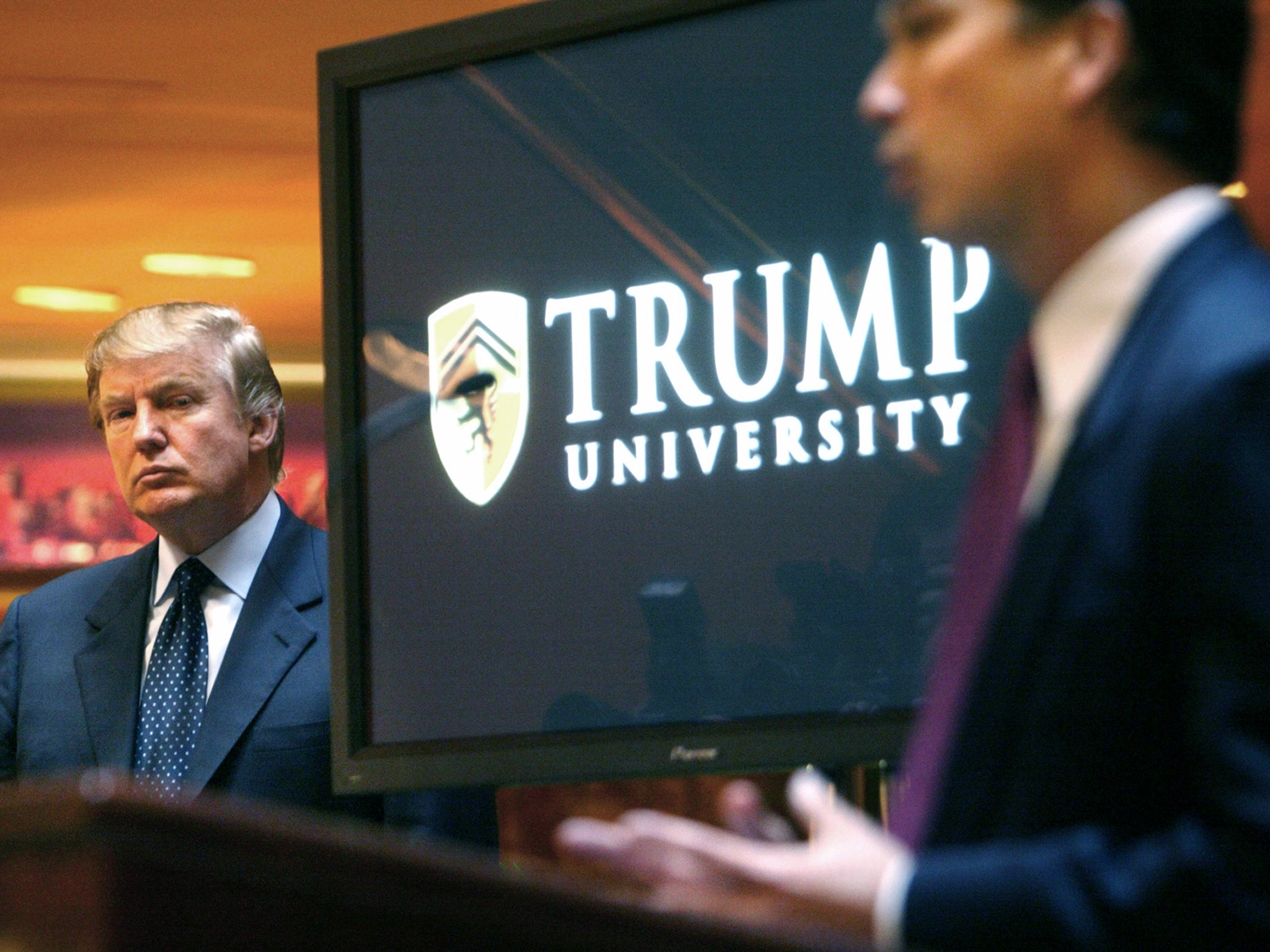Judge approves $25 million settlement of Trump University lawsuit
The decision by US District Judge Gonzalo Curiel in San Diego ends nearly seven years of legal battles

Your support helps us to tell the story
From reproductive rights to climate change to Big Tech, The Independent is on the ground when the story is developing. Whether it's investigating the financials of Elon Musk's pro-Trump PAC or producing our latest documentary, 'The A Word', which shines a light on the American women fighting for reproductive rights, we know how important it is to parse out the facts from the messaging.
At such a critical moment in US history, we need reporters on the ground. Your donation allows us to keep sending journalists to speak to both sides of the story.
The Independent is trusted by Americans across the entire political spectrum. And unlike many other quality news outlets, we choose not to lock Americans out of our reporting and analysis with paywalls. We believe quality journalism should be available to everyone, paid for by those who can afford it.
Your support makes all the difference.A judge has approved an agreement for President Donald Trump to pay $25 million (£19.9m) to settle lawsuits over his now-defunct Trump University.
The decision by US District Judge Gonzalo Curiel in San Diego ends nearly seven years of legal battles with customers who claimed they were misled by failed promises to teach success in real estate.
The ruling settles two class-action lawsuits and a civil lawsuit by New York Attorney General Eric Schneiderman.
Mr Trump had vowed never to settle but said after the election that he didn't have time for a trial, even though he believed he would have prevailed. Under terms of the settlement, he admits no wrongdoing.
The lawsuits alleged that Trump University gave nationwide seminars that were constantly pressuring people to spend more and, in the end, failing to deliver.
Attorneys for former customers have said their clients will get at least 90 per cent of their money back, based on the roughly 3,730 claims submitted.
Trump University dogged the Republican businessman throughout the campaign as rivals used Mr Trump's depositions and extensive documents filed in the lawsuits to portray him as dishonest and deceitful.
Mr Trump brought more attention by repeatedly assailing Judge Curiel, insinuating that the Indiana-born judge's Mexican heritage exposed a bias.
The judge rejected requests by two former students who objected to the settlement, scuttling the possibility of derailing the agreement with the prospect of more litigation.
When attorneys reached a deal shortly after Mr Trump's election, Judge Curiel said he hoped it would be part of “a healing process that this country very sorely needs.” A month later, he granted preliminary approval of the deal.
The settlement was announced 10 days before a trial was set to begin, sparing Mr Trump what would have been a major distraction. The trial would have been pinned on whether a jury believed Mr Trump misled customers by calling the business a university when it wasn't an accredited school and by advertising that he hand-picked instructors.
Transcripts of about 10 hours of Trump depositions provided additional material to rivals, though Judge Curiel denied a request to release video of Mr Trump's testimony that would have likely been used in campaign attack ads. Mr Trump acknowledged in the depositions that he played on people's fantasies, and he could not recall names of his employees despite his advertising pitch that he hand-picked them.
Mr Trump has repeatedly claimed a 98 percent customer satisfaction rate on internal surveys. Plaintiffs countered that students were asked to rate the product when they believed they still had more instruction to come and were reluctant to openly criticise their teachers on surveys that were not anonymous. \
Associated Press
Join our commenting forum
Join thought-provoking conversations, follow other Independent readers and see their replies
Comments